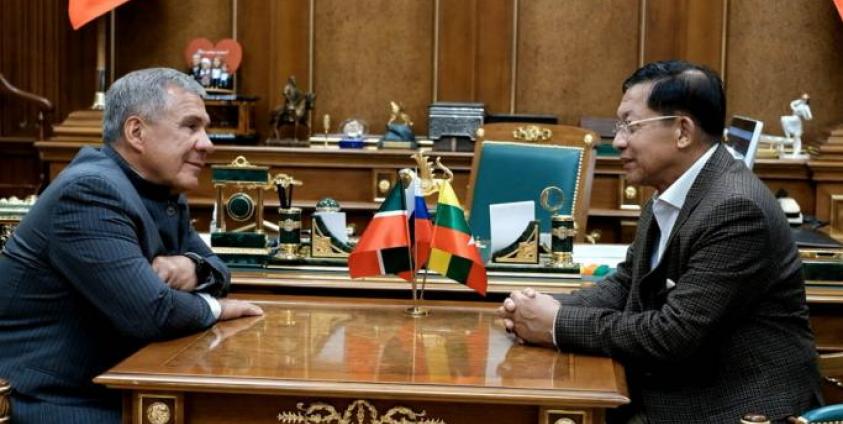Myanmar junta chief Min Aung Hlaing appears to be cozying up to the Russian government, judging by developments this week. Min Aung Hlaing made a “private visit” to Moscow on Monday, according to Russia’s Defence Ministry.
Russia and Myanmar are to deepen their defence cooperation after a meeting in Moscow between Myanmar's military leader and top Russian defence officials, Russia's Defence Ministry said on Tuesday.
According to the statement, passed on by Reuters: "The meeting ... confirmed the mutual disposition to consistently build up multifaceted cooperation between the military departments of the two countries."
Min Aung Hlaing’s visit to Moscow appears to have passed with little comment in the independent media, but it is clear that both sides – Russia and Myanmar – see the value in defence cooperation, as well as economic cooperation, and nuclear technology transfers. Russia seeks to expand and deepen markets for its defence hardware and Myanmar wants to bolster its defences as it struggles to battle against its own citizens.
A significant swing in world politics is underway in what has been referred to as a “new Cold War” that sees the West pitted against Russia and China and much of the rest of countries in Asia uncertain as to where to place their bets. This chilling of international relations has come about largely due to the Russian military operation in Ukraine and also due to the increasingly testy relationship between the USA and the West and an assertive China.
The Myanmar junta clearly recognizes who it needs to cozy up to – Russia and China - given the major outcry from the United Nations and many in the world community over the 2021 Myanmar military coup and the civil war the junta is waging.
At the same time, what appears like a rudderless Association of South East Asian Nations (ASEAN) is making a dog’s dinner of working together to tackle the Myanmar crisis and their agreed 2021 “Five-point consensus” that has gone nowhere. In addition, the regional body is on the fence when it comes to major players such as Russia and China. Eyebrows were raised when it was made clear that ASEAN defence ministers were planning a meeting in Moscow. Hundreds of Myanmar and international NGOs issued a statement this week calling on the South Korean defence minister not to go to the ASEAN Defence Ministers’ Meeting-Plus Experts’ Working Group (ADMM-Plus EWG) on Counter Terrorism, being co-chaired by the Myanmar and Russian militaries lined up for 20-21 July in Moscow. Australia and New Zealand have said they will not participate.
The Ukraine crisis has proved a test of where Asian country loyalties lie. While the US President Joe Biden is attempting to “pivot to Asia” – as Barack Obama sought to do a decade ago – the geopolitical sands are shifting as Russia, China, India and others in the Asian orbit strengthen relationships and seek independence from an increasingly troubled international order, exacerbated by the Western response to Russia’s actions in Ukraine.
The pros and cons of these shifting sands can be debated. But what Min Aung Hlaing’s cozying up to Russia means for many of the people of Myanmar is the danger posed by more bullets and bombs.








